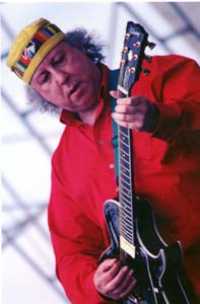. Peter Allen Greenbaum, 29 October 1946, Bethnal Green, London, England. Having served an apprenticeship in various semi-professional groups, including the Muskrats and the Tridents, Peter Green became one of several guitarists who joined John Mayall's Bluesbreakers as a temporary substitute for Eric Clapton during the latter's late 1965 sabbatical. When Mayall's preferred choice returned to the fold, Green joined Peter Bardens (organ), Dave Ambrose (bass) and Mick Fleetwood (drums) in a short-lived club band, the Peter B's Looners. The quartet completed one single for Columbia Records: "If You Wanna Be Happy"/"Jodrell Blues" in February 1966. The b-side, an instrumental, showcased Green's already distinctive style. The entire unit subsequently formed the instrumental core to the Shotgun Express, backing singers Rod Stewart and Beryl Marsden, but the guitarist found this role too restrictive and left after a matter of weeks. Green rejoined Mayall in July 1966 when Clapton left to form Cream.
Over the next 12 months Green made several telling contributions to the Bluesbreakers' recordings, most notably on their third album, A Hard Road. This powerful release featured two of the guitarist's compositions, of which "The Supernatural", a riveting instrumental, anticipated the style he would forge later in the decade. The seeds of Green's own band were sown during several sessions without Mayall and a Bluesbreakers "solo" single, "Curly", was released in March 1967. Two months later Green left to form his own band with drummer Mick Fleetwood. The two musicians added a second guitarist, Jeremy Spencer, to form Fleetwood Mac, whose line-up was eventually completed by another former Mayall sideman, John McVie. Fleetwood Mac became one of the most popular acts of the era, developing blues-based origins into an exciting, experimental unit. Green's personality, however, grew increasingly unstable and he became estranged from his colleagues. "Pete should never have taken acid," Fleetwood later recalled. "He was charming, amusing, just a wonderful person (but) off he went and never came back."
Green has followed an erratic course since leaving the band in May 1970. His solo debut, The End Of The Game, was a perplexing collection, consisting of six instrumentals, all of which were little more than jams. An atmospheric single, "Heavy Heart", followed in June 1971, while a collaboration with Nigel Watson, "Beasts Of Burden", was issued the following year. Green also made sporadic session appearances but following a cameo role on Fleetwood Mac's Penguin, the guitarist dropped out of music altogether. The mid-70s proved particularly harrowing; this tormented individual was committed to two mental institutions in the wake of his unsettled behaviour. Green returned to active recording in 1979 with In The Skies, a light but optimistic collection that showed traces of his erstwhile fire and included a version of "A Fool No More", first recorded by Fleetwood Mac. A second album, Little Dreamer, offered a more blues-based perspective while two further releases attempted to consolidate the artist's position.
In 1982, Green, now reverting to Greenbaum, began touring with a band named Kolors, but the results were unsatisfactory. A hastily concocted album, consisting of out-takes and unfinished demos, was issued, but a collaboration with former Mungo Jerry singer Ray Dorset aside, this once-skilful musician again abandoned music. Nicknamed the "Wizard" by local children, Green lived a hermit-like existence, shunning any links with his past. Rumours frequently circulated about his return to the music business, but most were instigated by tabloid journalists pining for his reappearance. In 1995, Gary Moore recorded an album of Peter Green tracks, Blues For Greeny. In 1996, rumours were confirmed that Green was becoming active again. He had purchased a guitar, was keen to play some old blues material, showed up onstage at a Gary Moore gig and best of all played live in May 1996. In August he played with the Splinter Group, Cozy Powell (drums), Nigel Watson (guitar) and Neil Murray (bass) at the Guildford Blues Festival. Although shaky on some numbers, he excelled on two familiar Freddie King songs, "The Stumble" and "Going Down". His new manager Stuart Taylor stated about Green's future, back in music; "I am cautiously optimistic". An album from the Splinter group was released in June 1997, and although flawed, it demonstrated Green's commitment to regaining the crown he never sought in the first place - as the UK's finest ever white blues guitarist. He then released The Robert Johnson Songbook, his first full studio album in almost two decades. Further albums have followed, demonstrating clearly that Green and his Splinter Group are serious about their music, and in particular Green's rediscovery of his pure blues roots. While he may no longer be a prolific guitar player, Green's voice has a fantastic smokey tone, beautifully aged and pleading. The way back is slow, but most definitely in the right direction
Source: http://WWW.FMLECACY.COM
